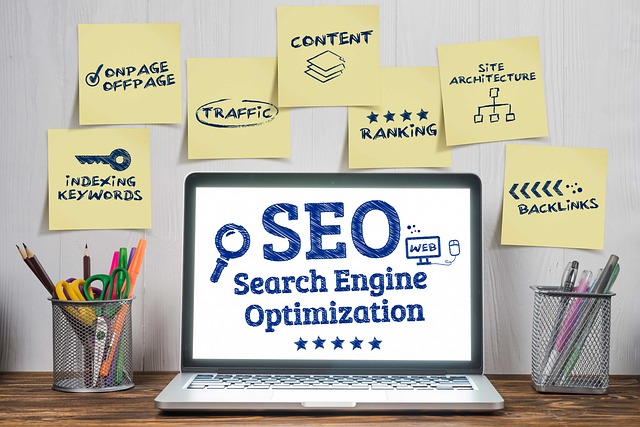Local SEO is vital for businesses aiming to dominate their geographic markets in today's digital era. Key strategies include optimizing online presence through relevant keywords, accurate information, and engaging content on websites and Google My Business (GMB) listings. Claiming and verifying local directories boosts visibility and credibility. Keyword research uncovers location-specific trends to target local audiences effectively. Integrating local keywords connects businesses with nearby customers, while building high-quality backlinks enhances credibility. Social media engagement reaches local communities, and measuring performance through tools like Google Analytics informs data-driven decisions. Staying ahead in Local SEO involves adapting to trends like voice search and user reviews, optimizing for mobile, and regularly updating business profiles.
In today’s digital landscape, Local SEO is vital for businesses aiming to thrive within their communities. Understanding how potential customers search locally can significantly boost visibility and attract nearby traffic. This article guides you through the intricacies of Local SEO, from optimizing Google My Business profiles and claiming listings to leveraging keywords, building backlinks, and harnessing social media. By implementing these strategies, businesses can enhance their local reach, engage with customers, and stay ahead in a competitive market.
Understanding Local SEO: Why It Matters for Your Business

In today’s digital era, Local SEO has become a game-changer for businesses seeking to thrive in their communities. Understanding local search engine optimization (Local SEO) is crucial for any company aiming to attract nearby customers and dominate local market competition. It involves optimizing your online presence to improve visibility and rankings in geographic search results, ensuring your business appears at the top when potential clients search for services or products within a specific area.
Given that most consumers turn to the internet when seeking local businesses, implementing effective Local SEO strategies can significantly impact your success. By optimizing your website, Google My Business listing, and other online directories with relevant keywords, accurate information, and engaging content, you enhance your chances of being found by customers in your target radius. This localized approach not only drives more traffic to your business but also fosters trust and encourages conversions, ultimately contributing to long-term growth and a stronger local reputation.
Optimizing Your Google My Business Profile

Optimizing your Google My Business (GMB) profile is a cornerstone of effective local SEO strategies. This free and powerful tool acts as a local business directory, providing essential information to potential customers within search engine results pages (SERPs). By ensuring your GMB profile is complete and accurate, you can enhance visibility for your business in local searches, which drives targeted traffic and fosters engagement. Update your profile with relevant keywords, a compelling description, and detailed category selections that accurately represent your offerings.
Don’t forget to include high-quality images, as visual content not only enhances the user experience but also signals to search algorithms that your listing is active and legitimate. Regularly engaging with your GMB profile by posting updates, offering promotions, or sharing customer reviews demonstrates business activity, further boosting your local SEO efforts. Additionally, encouraging satisfied customers to leave positive reviews can significantly impact your ranking and inspire trust among potential new patrons.
Claiming and Verifying Your Local Listings

Claiming and verifying your local listings is a crucial step in any comprehensive Local SEO strategy. It ensures that your business information is accurate and up-to-date across various online platforms, from Google My Business to Yelp and Facebook. By claiming these listings, you gain direct control over how your business appears to potential customers, allowing you to manage and optimize key details like address, operating hours, and contact information.
Verification adds an extra layer of credibility. It demonstrates to both search engines and consumers that your listing is genuine and trustworthy. This process often involves providing proof of business existence, such as a physical location or official documents. Once verified, these listings become powerful assets in enhancing local visibility and driving targeted traffic, ultimately contributing to better Local SEO results.
The Art of Keyword Research for Local Search

In the realm of Local SEO, keyword research is an art that involves understanding your target audience’s language and intent. It’s about discovering the terms local folks use when searching for businesses like yours online. Tools like Google Keyword Planner, SEMrush, or Ahrefs can help uncover these valuable insights by analyzing search trends, volume, and competition. This process allows you to identify relevant keywords specific to your location, services, and target market. For instance, if you’re a bakery in Paris, terms like “best croissants in Paris” or “bakery near me” could be powerful local SEO keywords.
The art lies in balancing popularity and relevance. While high-volume keywords attract traffic, they might not always convert. Local keywords with moderate search volume and strong relevancy can lead to higher conversion rates as they precisely match the intent of local customers searching for nearby services. Therefore, keyword research is a strategic step that ensures your business appears where it matters most—at the top of local search results.
Incorporating Local Keywords into Your Website Content

Incorporating local keywords is a fundamental strategy within Local SEO, allowing businesses to enhance their visibility and connect with nearby customers. When crafting website content, it’s essential to naturally weave in location-specific terms that potential clients might use when searching for services or products in their area. For instance, if you own a bakery in Paris, using keywords like “bakeries in Paris” or “best croissants near me” can significantly improve your local search rankings.
This approach not only helps search engines understand your business’s geographical focus but also increases the likelihood of being discovered by locals looking for specific products or services close by. By consistently integrating these local keywords into your website’s content, meta descriptions, and even blog posts, you’re signaling to both users and search algorithms that your business is a relevant and local option, thereby driving more targeted traffic and potentially increasing conversions.
Building Quality Backlinks for Local Visibility

Building quality backlinks is a cornerstone of successful Local SEO strategies. These links from authoritative, relevant websites act as digital endorsements, boosting your local business’s credibility and visibility in search results. When potential customers search for services or products in your area, strong backlink profiles signal to search engines that your business is trustworthy and locally relevant. Focus on earning backlinks through high-quality content that provides value to users, such as informative blog posts or engaging local community resources.
Partnerships with local influencers, collaborations with non-profit organizations, and contributions to industry publications can all lead to valuable backlinks. Remember, the goal is not just quantity but quality. Each backlink should ideally come from a reputable source that aligns with your business niche and targets a similar audience, reinforcing your local relevance in the eyes of search engines.
Utilizing Social Media for Enhanced Local Reach

In today’s digital age, social media platforms offer a powerful tool for boosting your local SEO efforts. By actively engaging with customers and potential clients on these platforms, businesses can significantly enhance their online visibility and reach within their target geographic area. Social media allows you to connect directly with your audience, fostering a sense of community and building brand loyalty. Regularly posting about local events, promotions, or even just sharing customer testimonials, can attract attention and encourage interactions from nearby users.
Utilizing hashtags related to your location and industry, along with geotagging your posts, helps to categorize your business within specific communities. This strategy ensures that when locals search for services or products in their area, your business is more likely to appear in their social media feeds and, consequently, on local search engine results pages. By combining these tactics, businesses can create a robust online presence, driving more traffic and potential customers straight from their local community.
Measuring and Analyzing Local SEO Performance

Measuring local SEO performance is a crucial step in understanding your online visibility and attracting potential customers within your target area. By utilizing tools like Google Analytics, you can track key metrics such as website traffic, conversion rates, and click-through rates from local search queries. Analyzing these data points helps identify trends and areas for improvement.
For instance, monitoring the number of visitors who find your business through local search results allows you to gauge the effectiveness of your optimized Google My Business listing and other local citations. Additionally, comparing the performance of different locations or branches can provide insights into what strategies are working best in specific regions, enabling data-driven decisions for optimizing your Local SEO efforts.
Staying Ahead: Trends and Best Practices in Local SEO

In the dynamic landscape of digital marketing, staying ahead in Local SEO is paramount for businesses aiming to dominate their geographic market. Trends evolve rapidly; from voice search integration to enhanced focus on user reviews and location-based content, what works today might be obsolete tomorrow. To stay relevant, businesses must embrace best practices such as optimizing for mobile-first search, claiming and verifying Google My Business listings, engaging with customers through online directories, and leveraging local keywords in their digital content.
Regularly updating business profiles with accurate information, encouraging positive reviews, and engaging in local community events can significantly boost a company’s online visibility. Additionally, utilizing location-specific meta tags, optimizing website loading speeds, and creating location-targeted marketing campaigns further solidifies a brand’s presence in local search results. By adapting to these trends and best practices, businesses not only attract more local customers but also build lasting digital authority within their communities.
